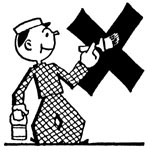
The Jesus Seminar: Making Uncomplicated Things Complicated
ON THE AUTHENTICITY OF ST. JOHN'S GOSPEL
Modern biblical scholarship has, with very little reason, doubted the authenticity of the fourth Gospel, the Gospel According to St. John. There was a time when critics saw an effort in John to combat the Gnostics of the second century. This would have put the date of writing too late for it to have been written by the Apostle John. But the discovery in some of the Dead Sea Scrolls of writings about the logos has rebuffed this challenge to the Gospel’s authorship. Still doubt persists.
For example, in their book Five Gospels, the Jesus Seminar prints what they regard as authentic sayings of Jesus in red ink, possibly by Jesus in pink, doubtful in blue, and all others in black. John’s Gospel has one saying in red and one in pink, while all the rest are in black. By contrast, in their “fifth Gospel,” the noncanonical Gospel of Thomas, red or pink ink appears on nearly every page.
The tradition that the Gospel of John was written by John the Apostle goes back to a very early time. It is attested to by Polycarp (c. 150), Melito of Sardis (c. 160), Clement of Alexandria (c. 200), and many others. They all confirm that the author was, in the words of St. Irenaeus (late 2nd century), “John, the disciple of the Lord, the same who rested upon Christ’s breast.”
So what are we to think? A touch of common sense will go a long way toward answering the question of authorship to the satisfaction of most open-minded people.
You May Also Enjoy
The possession of great riches, though not to be condemned in itself, nevertheless presents grave difficulties to the soul that seeks perfection.
Kass describes three key components in the formation of the Israelite nation: their deliverance from slavery, the covenant and Law, and the Tabernacle.
Where eternal rewards and punishments are concerned, are we more tenderhearted and clear-eyed than our forebears in faith -- than God Himself?

